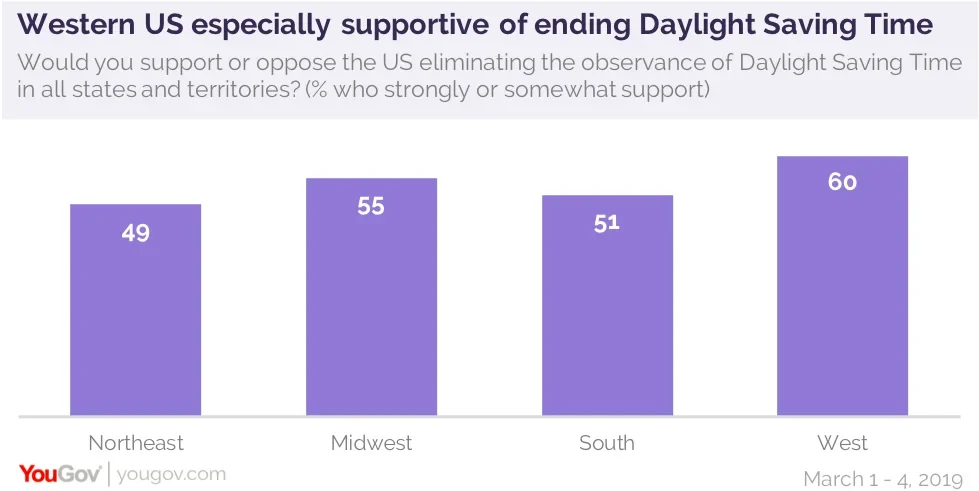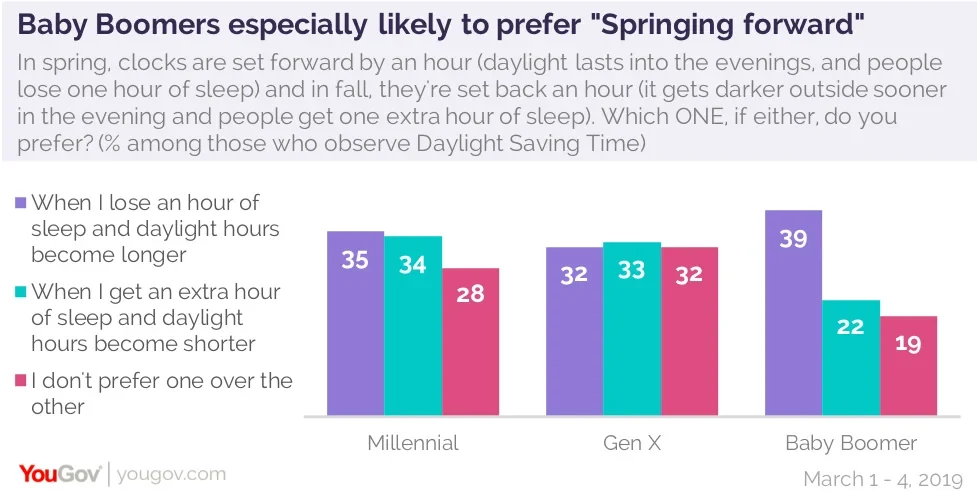People who live in the western US are most likely to support eliminating Daylight Saving Time
Daylight Saving Time will begin on Sunday, March 10 at 2 a.m., and most (88%) Americans will be affected, though many of these say they’d be happy to eliminate the practice altogether. Currently, Daylight Saving Time is not observed in Arizona, Hawaii, Puerto Rico, Guam, American Samoa and the U.S. Virgin Islands. Several states have proposed legislation to stop observing the occasion in their areas as well. They could find support among many Americans: A majority (54%) say that they would support the elimination of Daylight Saving Time in all US states and territories. People who live in the western US are most likely (60%) to support eliminating the practice for the entire country, while slightly fewer than half (49%) in the northeast say the same.

Millennials (44%) are generally less likely than members of Generation X (58%) and baby boomers (59%) to say they would support ending Daylight Saving Time.
Most Americans will “lose” an hour of sleep as the clocks are set forward and daylight hours will begin to last longer into the evening. Research from YouGov Omnibus suggests over one-third of those that observe it (35%) say they prefer this part of Daylight Saving Time, often referred to as “springing forward,” rather than the fall when the clocks are set back an hour and daylight hours become shorter (28%). This is often called “falling back”. Another 35% say they have no preference between the two.
Both millennials and Gen X’ers are nearly equally likely to prefer setting the clocks forward or turning them back. Baby Boomers, however, are much more likely to prefer “springing forward” (39%) rather than “falling back” (22%).

Americans have ideas about why Daylight Saving Time is observed in the first place. Roughly one-third (32%) say Daylight Saving Time is observed to save energy, though various studies have questioned whether this is truly the case. An equal number (32%) of Americans say we change the clocks so that farmers have more time to work, but that’s actually a common misconception.
Michael Downing, a Tufts University professor and author of Spring Forward: The Annual Madness of Daylight Saving Time, said in an interview with National Geographic that is the “complete inverse of what’s true.”
Observing Daylight Saving Time can disrupt activities like milking dairy cows and getting crops to market on time. "The farmers were the only organized lobby against daylight saving in the history of the country,” Downing said.
Almost three in ten (28%) Americans say Daylight Saving Time is still observed so that people can make better use of evening hours, while 22% think we keep doing it simply because “it’s too complicated to stop observing it at this point.”
See full results from this poll here.
Learn more about YouGov Omnibus.
YouGov Methodology: Total sample size was 1,288 US adults aged 18+, including 383 Millennials (birth year 1982-1999), 348 people from Generation X (birth year 1965-1981), and 424 Baby Boomers (birth year 1946-1964), 229 people in the Northeast, 270 people in the Midwest, 485 people in the South, and 304 people in the West surveyed. Interviews were conducted online between March 1 - 4, 2019.
Image: Getty










